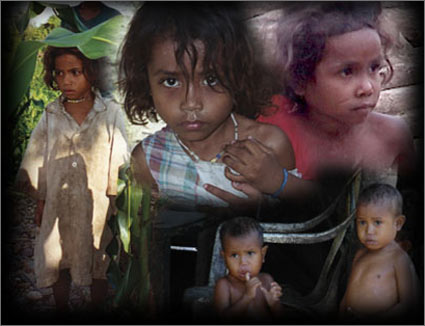HUMAN POPULATION DEMOGRAPHICS LAB WRITE-UP
This is the simulator you'll use for your lab write-up. It's a simple, but very powerful, way to see how population change depends on current population age distribution, along with reproductive and death rates. Your book also has a very good section on demographics.
The key to using the simulator is to open the "Options" button for each population comparison box. Select the first pull-down option under "Options" "Select Region/Country for Simulation." This will open a world map where you can select a particular country or region of the world and see its current population structure and then simulate its future population growth based on current statistics. PLEASE DO THE FOLLOWING:
1. Choose the entire World for the upper simulation. Run the simulation out to the year 2050 (as far as it goes).
2. Now choose a country for the lower simulation that has a much lower fertility rate than the entire world. Note if the initial population structure is different, and how. Then run the simulation out to year 2050.
3. Grab this screen shot and save it to post to your blog.
4. Repeat the same steps, but for a region or country with a much higher fertility rate than the entire world.
FOR YOUR WRITE-UP:
Post the two screen shots: one should have the world simulation compared with a lower fertility rate country or region; one should have the world simulation compared with a higher fertility rate country or region.
Answer the following questions:
1. What was your high fertility rate country and what was its fertility rate?
I choose Afghanistan with the high fertility of 6.4.

2. What was your low fertility rate country and what was its fertility rate?
I choose Taiwan for the low fertility. It shows that it on the decline. The fertility number was 1.8.

3. The initial demographic "shape" of your high fertility rate country should have been a pyramid, with high population in young age groups. Explain why high fertility rate results in a high percentage of young people in the population. How does this affect future population growth? It does show the decline of the older population. Maybe in this particular country people can not seek health care because they can not afford it. Also, on the up swing of that the younger population is growing because of no birth control.
4. Your low fertility rate country might have had a more oval-shaped curve with high population in middle age groups. This is especially exaggerated if the fertility rate is below 2.00. Explain why low fertility rate leads to lots of middle-aged people. I believe this leads to higher middle aged people because it could be due to malnutrition of the children, no proper prenatal care, and poverty.
5. Write ten adjectives or descriptive phrases for what you might expect life, people's attitudes, conditions on the streets, etc. will be like in each of those situations. Imagine a situation with lots of middle-aged and older people in the population and write ten quick "brain-storm" descriptors for you think it would be like (Prescott, Arizona?). Then do the same for a situation with lots of children in the population. I think a lot of areas are becoming just middle aged or elderly because of retirement places to live. The way the economy is going I believe less people are having children and the area you live in does make a difference. Some people may be living in poverty while others are just making ends meet. I think Prescott, Arizona is a retirement community because of the mild winters. This will lead to higher elderly and less children. When people are raising children they want to live in a community that has children their kids age. Its an interesting world we live in and is amazing how the countries differ in population.
To get full credit for this lab (20 points), you just have to post the two screen shots and answer all the questions.







